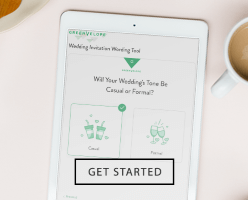18 Traditional Wedding Vows from Different Religions and Cultures
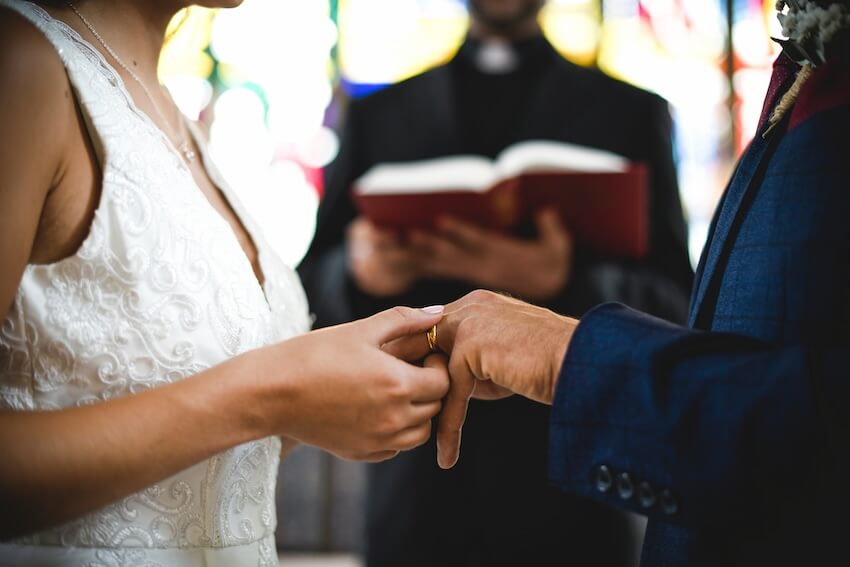
One important aspect of wedding planning that often doesn’t get much thought until later on is your wedding vows. Whether you’re hosting a religious or non-religious ceremony, you might feel inspired to include traditional wedding vows. And while some vows may be set in stone during religious ceremonies, others are more flexible and give you space to add some of your personality and uniqueness to the promises you make to each other.
In this guide, we’ll share some of the main reasons why you might choose traditional wedding vows. We’ll also take a look at vow examples from different cultures and religions, to give you some inspiration on how to choose or personalize your own big day.
When to Choose Traditional Wedding Vows
As you’re considering your vows, you might be wondering when it’s a good time to opt for something traditional over a more contemporary wedding ceremony. Here’s a look at why couples may choose to favor a traditional approach.
For a Religious Ceremony
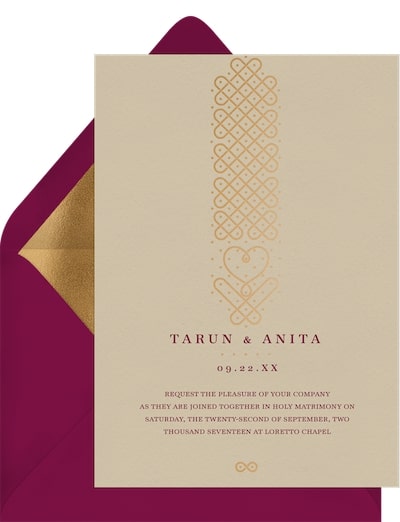
Design: Kiss by Kohl | Invitation: Kolam Invitation
If you plan a religious wedding ceremony, it’s often expected that you’ll recite vows that align with what’s traditional for that culture or religion. As you exchange wedding rings or take part in an unity ceremony, you’ll recite traditional marriage vows that solidify your commitment to each other.
Depending on the religion, these words may be the same for every ceremony, or you may have the opportunity to choose different versions or even completely customize them.
To Honor a Tradition
Sometimes the reason for choosing classic marriage vows isn’t always specific to religion but inspired by a personal or family tradition instead. Just as we include wedding traditions like lighting a unity candle or sand pouring, the vows themselves could honor a particular memory, tradition, or meaning that’s important to you as an individual or as a couple.
For a Traditional Style
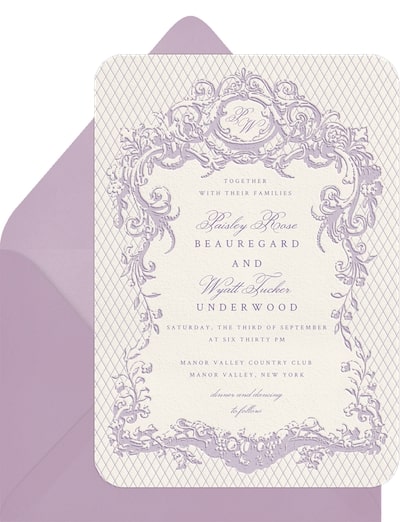
Design: Jen Montgomery | Invitation: Romantic Ornament Invitation
For some couples, the reason for choosing traditional marriage vows is a stylistic one. Perhaps you’re planning a traditional wedding overall, and want the promises you make to each other to match the atmosphere of your special day. Maybe you’ve always wanted to say those words you’ve heard countless times in movies. It’s your wedding day, so go as modern or traditional as you want!
If your whole vibe is classic and traditional, mirror this across other aspects of your day — including your wedding invitations. Our collection of highly customizable digital invitations has plenty of gorgeous designs that match a traditional wedding, whether it’s religious or non-religious in nature.
18 Examples of Traditional Wedding Vows
Whatever your reason for choosing traditional marriage vows, let’s take a look at some of the most popular examples from across the many religions and cultures of the world. Here are some typical vow examples that favor a traditional style.
1. Apache Wedding Vows
Within an Apache wedding, it’s traditional to have a wedding blessing. Although this wasn’t originally part of ceremonies, it was created and adopted by the community and now features regularly within wedding vow exchanges. Here’s the touching wedding blessing in its entirety:
“Now you will feel no rain, for you will be shelter to each other. Now you will feel no cold, for each of you will be warmth to the other. Now there is no more loneliness, for each of you will be companion to the other. Now you are two bodies, but there is only one life before you. Soon you will go to your resting place, to enter the days of your togetherness. May your days be good and long upon the earth.”
2. Baptist Wedding Vows
Before the rings are exchanged, couples at a traditional Baptist wedding ceremony also exchange their vows. These are often short and sweet, as in the example below.
“I, [Name], take thee, [Name], to be my [husband/wife], and before God and these witnesses, I promise to be a faithful and true [husband/wife].”
3. Buddhist Wedding Vows
At a traditional Buddhist wedding ceremony, the officiant will ask the happy couple a series of questions, to which they’ll then respond. These vows can vary slightly depending on the individuals involved but may look similar to this:
“Officiant: Life will not always be smooth, and sometimes your own minds and emotions may get stuck in negativity. Do you pledge to see these circumstances as a challenge to allow you to grow, open your heart, accept yourselves and each other, and to create compassion for others that are suffering? Do you pledge to avoid becoming narrow, closed, or opinionated, and to help each other see all sides of a situation?
Couple: We do
Officiant: Just as we are a mystery to ourselves, each other person is also a mystery to us. Do you pledge to seek to understand yourselves, each other, and all living beings, and to examine your own minds continually and to regard all the mysteries of life with curiosity and joy?
Couple: We do
Officiant: Do you pledge to preserve and enrich your affection for each other and share it with all? To take the loving feeling you have for each other and your vision of each other’s potential and inner beauty as an example and, rather than spiraling inwards and becoming self-absorbed, radiate this love outwards to all beings?
Couple: We do.”
4. Catholic Wedding Vows
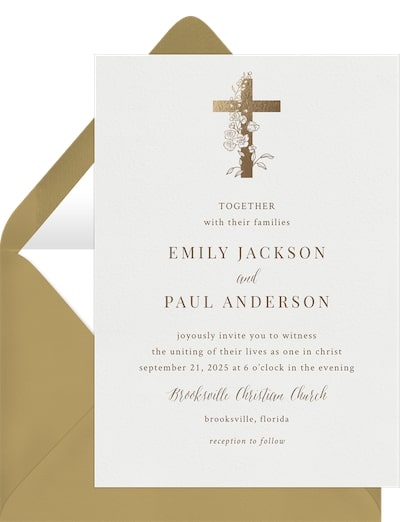
Design: Vera Lim | Invitation: Gilded Floral Cross Invitation
If you’re having a traditional Catholic wedding, you’ll likely be saying one of these two sets of church-approved wedding vows. They’re both focused on loving each other through the good and bad times, reflecting the togetherness of marriage.
“I, [Name], take you, [Name], to be my [husband/wife]. I promise to be true to you in good times and in bad, in sickness and in health. I will love and honor you all the days of my life.”
or
“I, [Name], take you, [Name], for my lawful [husband/wife], to have and to hold from this day forward, for better, for worse, for richer, for poorer, in sickness and health, until death do us part.”
5. Cherokee Wedding Vows
While a ring exchange is a staple in many wedding ceremonies, it’s not a traditional part of a typical Cherokee wedding. Instead, the ceremony includes a wedding blessing that honors the couple’s commitment to each other.
“God in heaven above, please protect the ones we love. We honor all you created as we pledge our hearts and lives together. We honor Mother Earth and ask for our marriage to be abundant and grow stronger through the seasons. We honor fire and ask that our union be warm and glowing with love in our hearts. We honor the wind and ask that we sail through life safe and calm as in our father’s arms. We honor water to clean and soothe our relationship, that it may never thirst for love. With all the forces of the universe you created, we pray for harmony as we grow forever young together. Amen.”
6. Episcopal Wedding Vows
At an Episcopal wedding, the officiant will ask the couple questions to which they’ll be expected to respond to. This forms the formal wedding vows, and looks like this:
“Officiant: [Name], wilt thou have this [woman/man] to be thy wedded [wife/husband] to live together after God’s ordinance in the Holy Estate of matrimony? Wilt thou love [her/him], comfort [her/him], honor and keep [her/him], in sickness and in health, and forsaking all others keep thee only unto [her/him] as long as you both shall live?
Individual: I will.”
As with many other Christian ceremonies, couples can also choose to say a series of vows as they exchange rings and form their wedding contract, such as below:
“[Name], in the name of God, I, [Name], take you to be my [wife/husband], to have and to hold from this day forward, for better, for worse, for richer, for poorer, in sickness and health, to love and to cherish, until death do us part. This is my solemn vow.”
7. Hindu Wedding Vows
At a traditional Hindu ceremony, the vow exchange includes taking seven steps (also known as Saptapadi). These steps reflect the promises that the couple make to each other, and these are explained in the wedding vows.
“Let us take the first step to provide for our household a nourishing and pure diet, avoiding those foods injurious to healthy living. Let us take the second step to develop physical, mental, and spiritual powers. Let us take the third step to increase our wealth by righteous means and proper use. Let us take the fourth step to acquire knowledge, happiness, and harmony by mutual love and trust. Let us take the fifth step so that we are blessed with strong, virtuous, and heroic children. Let us take the sixth step for self-restraint and longevity. Finally, let us take the seventh step and be true companions and remain lifelong partners by this wedlock.”
8. Jewish Wedding Vows
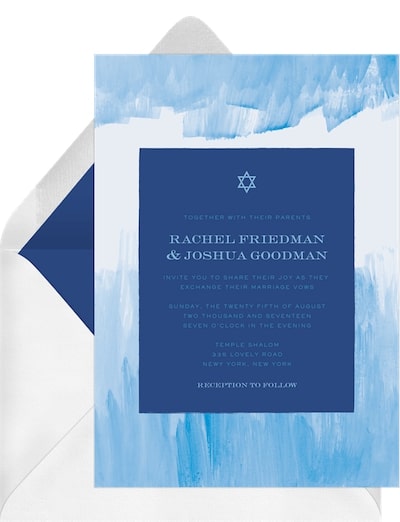
Design: Lisa Travis | Invitation: Blue Brushstrokes Invitation
While other cultures and religions may have set wedding words and phrases for vows, this isn’t the case for traditional Jewish weddings. With the marriage contract forming at the exchange of rings and the seven blessings, there are no formal wedding vows necessary. Still, some couples choose to include their own vows — an example of this is below.
“Do you, [Name], take [Name] to be your [wife/husband], to honor, cherish, and love?”
9. Lutheran Wedding Vows
Lutheran wedding vows focus on solidarity and fidelity, and the words exchanged reflect this. The vows are often first read by the officiant, and then repeated back by the happy couple.
“I, [Name], take you, [Name], to be my [husband/wife], and these things I promise you: I will be faithful to you and honest with you. I shall respect, trust, help, and care for you. I will share my life with you. I will forgive you as we have been forgiven, and I will try with you to better understand ourselves, the world, and God, through the best and worst of what is to come, and as long as we live.”
10. Methodist Wedding Vows
It’s typical for a traditional Methodist wedding ceremony to include “call and response” vows, where the officiant poses questions to the couple and they then respond with “I do.”
“Officiant: Will you have this [man/woman] to be your [husband/wife], to live together in holy marriage? Will you love [him/her], comfort [him/her], honor, and keep [him/her] in sickness and in health, and forsaking all others, be faithful to [him/her] as long as you both shall live?
Individual: I do”
The couple will also recite the following traditional words at the ring exchange:
“I give you this ring as a sign of my vow, and with all that I am, and all that I have, I honor you in the name of the Father, and of the Son, and of the Holy Spirit. Amen.”
11. Mormon Wedding Vows
Mormon weddings feature a specific set of statements, and these traditional wedding vows are set out below.
“Officiant: Brother [Name], do you take Sister [Name] by the right hand and receive her unto yourself to be your lawful and wedded wife for time and all eternity, with a covenant and promise that you will observe and keep all the laws, rites, and ordinances pertaining to this Holy Order of Matrimony in the New and Everlasting Covenant, and this you do in the presence of God, angels, and these witnesses of your own free will and choice?
Groom: I do.
Officiant: Sister [Name], do you take Brother [Name] by the right hand and receive him unto yourself to be your lawful and wedded husband for time and all eternity, with a covenant and promise that you will observe and keep all the laws, rites, and ordinances pertaining to this Holy Order of Matrimony in the New and Everlasting Covenant, and this you do in the presence of God, angels, and these witnesses of your own free will and choice?
Bride: I do.”
12. Muslim Wedding Vows
Muslim weddings do not always feature traditional vows, but the couple may choose to include them after the cleric’s wedding blessing. An example of Muslim wedding vows looks like this.
“Bride: I, [Name], offer you myself in marriage in accordance with the instructions of the Holy Quran and the Holy Prophet, peace and blessing be upon him. I pledge, in honesty and with sincerity, to be for you an obedient and faithful wife.
Groom: I pledge, in honesty and sincerity, to be for you a faithful and helpful husband.”
13. Pagan Wedding Vows
For a traditional Pagan wedding, the vows again focus on being together and supporting each other through all the moments in life. They also touch on respect, individuality, and life beyond this one.
“I promise to love thee wholly and completely, without restraint, in sickness and in health, in plenty and in poverty, in life and beyond, where we shall meet, remember, and love again. I shall not seek to change thee in any way. I shall respect thee, thy beliefs, thy people, and thy ways, as I respect myself.”
14. Presbyterian Wedding Vows
The vows exchanged by a couple in a Presbyterian wedding ceremony come from the Common Book of Worship, and are as follows:
“Officiant: [Name], wilt thou have this [man/woman] to be thy [husband/wife], and wilt thou pledge thy faith to [him/her], in all love and honor, in all duty and service, in all faith and tenderness, to live with [him/her], and cherish [him/her], according to the ordinance of God, in the holy bond of marriage?”
Individual: I do.”
The couple may also recite the following vows as they exchange rings and make their commitment to each other.
“I, [Name], take you, [Name], to be my wedded [husband/wife], and I do promise and covenant, before God and these witnesses, to be your loving and faithful [wife/husband], in plenty and want, in joy and in sorrow, in sickness and in health, as long as we both shall live.”
15. Quaker Wedding Vows
Quaker weddings are simpler than some other types of ceremonies, and don’t feature an exchange of rings. Instead, the couple may recite these wedding vows after their marriage certificate is read aloud.
“In the presence of God and these our friends, I take thee, [Name], to be my [wife/husband], promising with divine assistance to be unto thee a loving and faithful [husband/wife] so long as we both shall live.”
16. Unitarian Wedding Vows
As with many other Christian ceremonies, Unitarian wedding vows are said in “call and response” fashion — first by the officiant, and then by the soon-to-be newlyweds.
“Officiant: [Name], will you take [Name] as your [husband/wife]? Will you pledge to share your life openly with [him/her], to speak the truth to [him/her], in love? Will you promise to honor and tenderly care for [him/her], to encourage [his/her] fulfillment as an individual through all the changes in your lives?
Individual: I will.”
17. Interfaith Wedding Vows
When a marriage ceremony blends two religions or cultures together, it’s the perfect opportunity to blend traditional elements of both and write your own wedding vows. With so many different traditions to honor, you may choose to keep the vows themselves simple.
“I, [Name], take you, [Name] to be my [husband/wife] in sickness and in health, through the good times and the bad. I will love, cherish, and honor you as long as we both live.”
18. Non-Denominational Wedding Vows
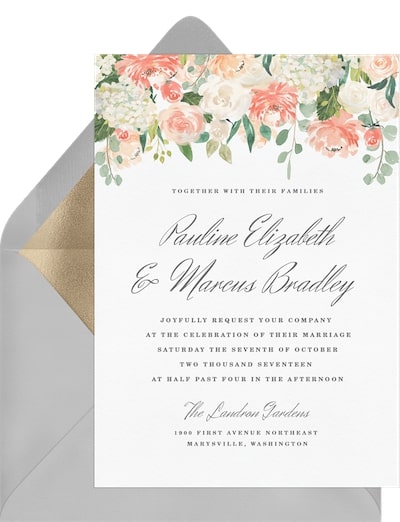
Design: Robinson Creative House | Invitation: Pretty Pastel Peonies Invitation
At a non-denominational Christian wedding, the couple is free to customize their wedding vows to reflect their own personal wishes.
“I, [Name], take you, [Name], to be my [wife/husband]. I will honor, cherish, and love you, until death do us part. I will forever be faithful to you as we journey through life together.”
Celebrate Your Love for Each Other with These Traditional Wedding Vows
The exchange of vows is a highly personal and symbolic moment, so it makes sense to use traditional words and phrases to help you do this. Use this guide to find traditional marriage vows that align with your needs.
While you’re considering your vows, look for other ways to celebrate your classic theme — like with our traditional wedding invitations. There’s a style to match every culture, religion, or ceremony, and they’re customizable too — so you can make them feel perfectly bespoke.

